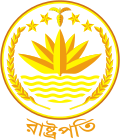History
Since the independence of Bangladesh, eleven presidential elections have been held, of which three were direct elections. After independence in 1974, Speaker of the Assembly Mohammad Mohammadullah became the first president of Bangladesh without any contestation through an election. [6] [7] He was elected through the first presidential election before presidential government system was introduced. The election was held on 24 January 1974. The constituent parliament members elected him unanimously.
The next presidential election, the first direct or public presidential election was held on 3 June 1978, with the participation of general voters. [8] Eleven candidates submitted their nomination papers to run for the election. Two nomination papers were disapproved initially. However, the contestant number rose to 10 as the appeal of one of the two disqualified contestants was accepted. Major General Ziaur Rahman was elected as president in that election. [7] [9]
The direct presidential election for the second time was held on 15 November 1981 in the same manner. Eighty-three candidates for the election submitted nomination papers. Eleven nomination papers were disapproved. The number of valid candidates became 72. Later, 33 of the 72 candidates withdrew their candidacy making the number of contestants 39. Justice Abdus Sattar was elected as president in that election. [7] [10]
The third direct presidential election was held on 15 October 1986. In this election, 16 candidates submitted nomination papers; however, following the withdrawal of candidacy of four candidates, the total number of contestants became 12. Notably the election was boycotted by the major opposition parties, who demanded the lifting of martial law. [11] [12] Incumbent Lt. Gen. Hussain Muhammad Ershad, who had assumed office three years early [11] following a military coup which he led, was elected as the president in that election, [7] [13] despite reports of irregularities. [12]
In 1991, parliamentary government system was restored in Bangladesh. [7] [14] Since the restoration of the parliamentary system, the president is elected by the parliament members. After 1991, persons who have been elected to the post of president include Abdur Rahman Biswas, [7] [15] Justice Shahabuddin Ahmad, [7] Professor Dr. AQM Babdruddoza Chowdhury, [7] [16] Professor Dr. Iajuddin Ahmed, [7] [17] Zillur Rahman [7] [18] and Abdul Hamid. [7] [19] [20] All of them have been elected uncontestedly.
This page is based on this
Wikipedia article Text is available under the
CC BY-SA 4.0 license; additional terms may apply.
Images, videos and audio are available under their respective licenses.




